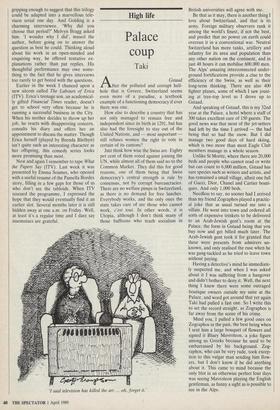High life
Palace coup
Taki
fter the polluted and corrupt hell- hole that is Greece, Switzerland seems even more of a paradise, a textbook example of a functioning democracy if ever there was one.
How else to describe a country that has not only managed to remain free and independent since its birth in 1291, but has also had the foresight to stay out of the United Nations, and — most important still refuses women the right to vote in certain of its cantons?
Just think how wise the Swiss are. Eighty per cent of them voted against joining the UN, while almost all of them said no to the Common Market. They did this for good reasons, one of them being that Swiss democracy's central strength is rule by consensus, not by corrupt bureaucracies. There are no welfare pimps in Switzerland, as there is no demand for free lunches. Everybody works, and the only ones the state takes care of are those who cannot work, c'est tout. In other words, it is Utopia, although I don't think many of those buffoons who teach socialism in I said television has killed the art... oh, forget it.'
British universities will agree with me.
Be that as it may, there is another thing I love about Switzerland, and that is its army. Foreign military observers rank it among the world's finest, if not the best, and predict that no power on earth could overrun it in a conventional war. Neutral Switzerland has more tanks, artillery and infantry for its area and population than any other nation on the continent, and in just 48 hours it can mobilise 600,000 men. The Alps' amazing interconnected under- ground fortifications provide a clue to the efficiency of the Swiss, as well as their long-term thinking. There are also 400 fighter planes, some of which I saw joust- ing at tree-top level as I drove up to Gstaad.
And speaking of Gstaad, this is my 32nd year at the Palace, a hotel where a staff of 300 takes excellent care of 150 guests. The good news was that most of the jet-setters had left by the time I arrived — the bad being that so had the snow. But I did manage two good days of hard skiing, which is two more than most Eagle Club members manage in a whole season.
Unlike St Moritz, where there are 20,000 beds and people who cannot read or write but can count to 6,000 million, Gstaad has rare species such as writers and artists, and has remained a small village, albeit one full of Gucci, Dior, Chanel and Cartier bouti- ques. And only 1,000 beds.
Needless to say, no sooner had I arrived than my friend Zographos played a practic- al joke that as usual turned me into a villain. He went into town and ordered all sorts of expensive trinkets to be delivered to an Arab-Jewish gent's room at the Palace, the form in Gstaad being that you buy now and get billed much later. The Arab-Jewish gent took it for granted that these were presents from admirers un- known, and only realised the ruse when he was gang-tackled as he tried to leave town without paying.
Having a detective's mind he immediate- ly suspected me, and when I was asked about it I was suffering from a hangover and didn't bother to deny it. Well, the next thing I knew there were some outraged boutique owners outside my suite at the Palace, and word got around that yet again Taki had pulled a fast one. So I write this to set the record straight, as Zographos is far away from the scene of his crime.
Mind you, I pulled a few good ones on Zographos in the past, the best being when I sent him a large bouquet of flowers and signed it Bluey Mavroleon, a joke figure among us Greeks because he used to be embarrassed by his background. Zog- raphos, who can be very rude, took excep- tion to this vulgar man sending him flow- ers, but I don't know if he did anything about it. This came to mind because the only blot in an otherwise perfect four days was seeing Mavroleon playing the English gentleman, as funny a sight as is possible to see in the Alps.


















































 Previous page
Previous page